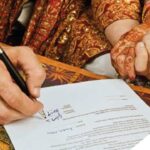Index
- What Is A Witness
- What Documents Are Needed from The Witnesses ?
- How Many Witnesses Are Required?
- Can Family Members Be Witnesses?
- Are Witnesses Required For Every All Registered Marriages?
- What Are The Requirements According To The Special Marriage Act (1954)?
- What Are The Requirements According To Arya Samaj Marriage?
- How To Be A Witness For A Marriage Registration?
- What Are The Liabilities Of A Marriage Witness?
- Who Can Be A Marriage Witness?
Contents
IndexWhat Is A Witness? What Documents Are Needed from The Witnesses ?How Many Witnesses Are Required?Can Family Members Be Witnesses?Are Witnesses Required For Every All Registered Marriages? What Are The Requirements According To The Special Marriage Act (1954)? What Are The Requirements According To Arya Samaj Marriage? How To Be A Witness For A Marriage Registration? Before The Registration:During the Registration:After The Registration:What Are The Liabilities Of A Marriage Witness?Who Can Be A Marriage Witness?
What Is A Witness?
A witness is any person of legal age who plays the vital role of being present during a marriage registration to confirm the marriage is legitimate and legal. A witness may present themselves during future disputes that arise.
What Documents Are Needed from The Witnesses ?
- Residential Proof
- ID Proof: Aadhaar card, Voter ID, etc.
- PAN Card
- Passport-sized Photograph
- Signature: On the witness form
How Many Witnesses Are Required?
Minimum Two Witnesses are required to witness a marriage registration as per law.
Can Family Members Be Witnesses?
Yes, if Eligible. Family members can be witnesses if they meet the criteria.
Parents or siblings might not be suitable if they oppose the marriage.
Are Witnesses Required For Every All Registered Marriages?
Witnesses are required for all registered marriages in India, no matter the specific act (e.g., Special Marriage Act or Arya Samaj marriage).
What Are The Requirements According To The Special Marriage Act (1954)?
- The court issues a 30-day notice to the couple’s families for potential objections.
- After the notice period, the couple and their witnesses appear before the court.
- Witnesses present their documents, sign the marriage registration form, and confirm the ceremony’s legitimacy.
- Family members are generally preferred as witnesses.
What Are The Requirements According To Arya Samaj Marriage?
- The same number of witnesses required for registration must be present during the ceremony.
- Photos and signatures of the witnesses are taken as proof.
- Witnesses should arrive on time with necessary documents.
- Witnesses observe the entire ceremony and sign the marriage documents afterward.
How To Be A Witness For A Marriage Registration?
Before The Registration:
- Agree to be a witness: Only if you’re comfortable confirming the couple’s eligibility and the ceremony’s validity.
- Prepare documents: Gather your residential proof, ID (Aadhaar, Voter ID, etc.), PAN card, and a passport-sized photo.
During the Registration:
- Be present: Arrive at the registrar’s office on time.
- Verify documents: Ensure your documents are in order when presented.
- Witness the ceremony: Observe the registration process.
- Sign the form: Sign a form to confirm your presence as a witness.
After The Registration:
- Be available: You might be needed for court appearances if disputes arise.
- Cooperate with investigations: Assist authorities if there are legal investigations related to the marriage.
What Are The Liabilities Of A Marriage Witness?
- Fraudulent marriage: If you witness a marriage with false age representation, you can be held liable under Section 118 of the Indian Evidence Act, 1872.
- Marriage of a minor: Witnessing the marriage of a minor is an offence under Section 34 of the Indian Penal Code.
Who Can Be A Marriage Witness?
- Any legal citizen: Must be willing to be present during the registration.
- Eligible individuals: Family members, relatives, friends, and colleagues.
- Registration type: Witnesses are required for both online and offline registrations.
- Preferred witnesses: Ideally, someone reliable and known to the couple.
- Eligibility: Must be 18 or older, mentally sound, and not involved in marital disputes.











